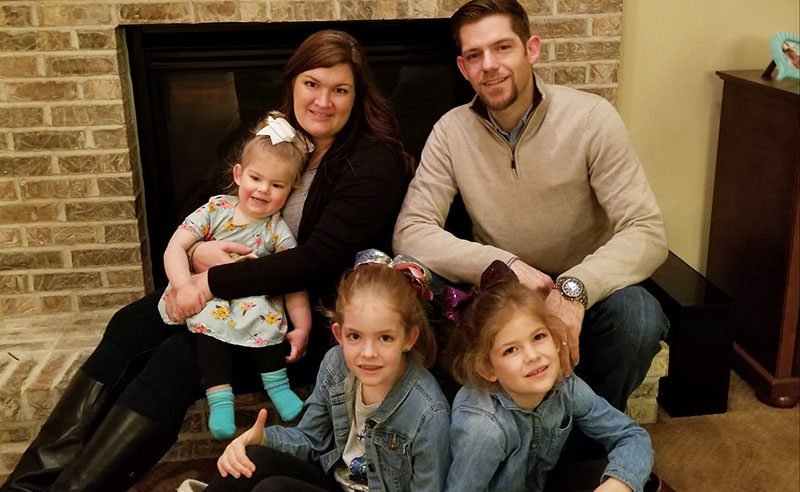The KIF1A community has huge impact on pace and progress. Our mission is clear and our actions are swift. KIF1A.ORG exists to eliminate challenges for families affected by KIF1A Associated Neurological Disorder through open communication and accurate information. KIF1A families are relentless in driving discovery and empowering community.
Connecting Families
KAND is a rare disease. This diagnosis comes with a lot of questions, but not many answers. There are now over 550 people diagnosed with KIF1A Associated Neurological Disorder (KAND) and the prevalence of KAND continues to grow exponentially. Families from more than 40 countries are members of KIF1A.ORG, proving a global unmet need for diagnostic tools, awareness and treatment options.
In January of 2019 we received a phone call from our youngest daughter’s genetic counselor, explaining that Abigail had KIF1A Associated Neurological Disorder. With only a brief explanation, and 2 months until our appointment with her doctor, we understood little about the realities of this diagnosis. Due to the accessibility of KIF1A.ORG, we found this site and were equipped with details about her disease. We were instantly connected to families and researchers, who have supported us and have enabled us to better care for Abby.
— The Gogel Family

Supporting Research
KIF1A.ORG is the only organization driving multiple initiatives to treat and cure KAND. Together, with our collaborative Research Network of scientists, clinicians, biotech leaders and innovators from around the world, we’re getting closer to treatments each and every day.
KIF1A.ORG research milestones include:
- A robust KAND study powered by Chung Lab, tracking longitudinal natural history data, disease progression, disease severity, genotype/phenotype correlations, endpoints and measurable outcomes, making KIF1A.ORG a clinical trial ready community
- A biobank of tissue and blood samples for use in research in partnership with the Chung Lab
- Mouse models in partnership with The Jackson Laboratory to test potential therapeutics
- Induced pluripotent stem cells (iPSCs) in partnership with the Coriell Institute and isogenic lines in partnership with The Jackson Laboratory to study cell phenotypes and potential therapeutics
- An iPSC-based drug screening platform in partnership with NeuCyte, which is open to academic and biotech members of the KIF1A Research Network
To learn more about our scientific collaborations and funded projects, visit our KIF1A Research Network page.
The parents behind KIF1A.ORG have shown incredible leadership and epitomize the powerful partnerships that are possible to accelerate research to find new treatments for rare genetic diseases. They have catalyzed the community to make advances in KIF1A that will help us understand not only KIF1A Associated Neurological Disorder but also other related genetic conditions.
— Wendy Chung, MD, Ph.D., Boston Children’s HospitalI have never interacted with a more passionate, organized, and intelligent organization focused on finding a cure for a disease. Despite limited resources, KIF1A.ORG has managed to engage and recruit new researchers studying both basic and translational aspects of KAND, and provide them with tangible information to help guide and accelerate that new research. … In bringing us together with patients, families, and other researchers, our understanding of KAND has been greatly accelerated and potential new therapeutic options are likely to be generated years ahead of what would have been possible without the involvement of KIF1A.ORG.
— Christopher Berger, Ph.D., University of Vermont
The Driving Force: An Active Community
KIF1A.ORG thanks our key partners and rare disease leaders who support progress through urgency and collaboration. Together, we are stronger every day.
KIF1A.ORG has grown impressively and continues to admirably support and represent the KIF1A community. Here in Washington, D.C., KIF1A.ORG reliably supports not only their own community in policymaking conversations, but contributes a valuable voice to discussions on how best to improve the lives of the 25-30 million Americans living with a rare disease.
— Paul Melmeyer, Former Director of Federal Policy at National Organization for Rare Disorders
It has become critically important for patient organizations to be prepared partners for future research and drug development collaborations. Luke Rosen and the KIF1A community have become an important example of a progressive and readied patient community. Luke has helped coordinate patients and families within the KIF1A disease community, has built early collaborations with clinical researchers, and has educated and prepared the community to be readied to participate in research efforts.
— Nicole Boice, Founder & Board Member at Global Genes


